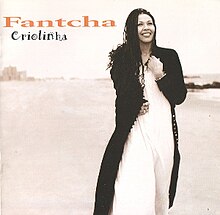Criolinha is an album by the Cape Verdean musician Fantcha.[3][4] It was released in the United States in 1998.[5] The album is primarily a collection of coladeira songs, although it includes a few mornas.[6][7] Fantcha supported the album with a North American tour.[8]
| Criolinha | ||||
|---|---|---|---|---|
 | ||||
| Studio album by | ||||
| Released | 1997 | |||
| Label | Lusafrica[1] Tinder[2] | |||
| Producer | Bau | |||
| Fantcha chronology | ||||
| ||||
Production
editMembers of Césaria Évora's musical groups backed Fantcha; Évora had been a friend and instructor.[9] Criolinha was produced by Bau, who also played on the album.[10][11] Fantcha sang in what she described as "Creole" Portuguese.[12]
Critical reception
edit| Review scores | |
|---|---|
| Source | Rating |
| AllMusic | [9] |
| Robert Christgau | [13] |
| Contra Costa Times | A[2] |
| MusicHound World: The Essential Album Guide | [10] |
JazzTimes wrote that "Fantcha’s fine vocals are nicely wrapped in production textures that manage to be both slick and raw, with the fanciful saloon pianisms and multiguitar Gypsy flourish of Evora’s recordings."[14] Newsday determined that, "with its principally acoustic instrumentation, Criolinha succeeds in creating an ambiance that seems rooted in tradition without feeling old-fashioned."[15]
Rolling Stone stated that Fantcha "intones brokenhearted ballads in Creole-Portuguese while violins and clarinets longingly accompany her."[16] The Chicago Tribune concluded that the album "has a fuller sound, a sometimes rougher beauty, and definitely a more danceable, swaying beat [than Évora's work]."[17]
AllMusic wrote that "Criolinha is a collection of sadly poignant and touching songs from a gifted vocalist refined with world-class tutelage."[9] In 2005, The Boston Globe labeled the album "a gorgeous collection that captures [Fantcha's] silky, insinuating voice."[18]
Track listing
edit| No. | Title | Length |
|---|---|---|
| 1. | "Sol jà cambà" | |
| 2. | "Mi é dode na bô Cabo Verde" | |
| 3. | "Nostalgia" | |
| 4. | "Fidjos de adào e eva" | |
| 5. | "Causa d'nha dor" | |
| 6. | "Sodade de mundo" | |
| 7. | "Cinderela" | |
| 8. | "Sonho d'um criôl" | |
| 9. | "Cmê catchôr" | |
| 10. | "Um cria ser poeta" |
References
edit- ^ "Paris". Culture. Le Monde. 27 Mar 1998. p. 29.
- ^ a b Doyle, Alan (October 2, 1998). "Fantcha'S Voice Drapes African-Inspired Rhythms". Contra Costa Times. p. TO24.
- ^ "Fantcha Biography, Songs, & Albums". AllMusic.
- ^ "Soundwaves...". Islands. Vol. 18, no. 4. Jul–Aug 1998. p. 36.
- ^ "An annotated listing of new folk recordings, videos & books". Sing Out!. 43 (1): 162. Summer 1998.
- ^ Hund, Peter (Aug 1998). "Music". World Trade. 11 (8): 88.
- ^ Beck, John (4 Oct 1998). "Beautiful Noise". The Press Democrat. p. Q3.
- ^ Shatz, Adam (31 July 1999). "The soulful sounds of Cape Verde". Entertainment. National Post. p. 8.
- ^ a b c "Criolinha". AllMusic.
- ^ a b MusicHound World: The Essential Album Guide. Visible Ink Press. 2000. p. 261.
- ^ Ambrose, Robert (1998). "Fantcha is a protégée of Cesaria Evora...". The Beat. Vol. 17, no. 3. pp. 34, 88.
- ^ Young, Bob (August 10, 1999). "Cape Verde's Fantcha voices mentor's heartfelt lessons". Arts & Lifestyle. Boston Herald.
- ^ "Fantcha". Robert Christgau.
- ^ Woodard, Josef. "Fantcha: Criolinha". JazzTimes.
- ^ Lipp, Marty (19 July 1998). "World Music". Newsday. p. D24.
- ^ "Tinder". Rolling Stone. No. 802/803. Dec 24, 1998. p. SS28.
- ^ Obejas, Achy (23 June 2000). "Rhythm and Realities". Friday. Chicago Tribune. p. 7.
- ^ Gilbert, Andrew (13 Feb 2005). "Need an introduction to Cape Verdean music?". The Boston Globe. p. N1.